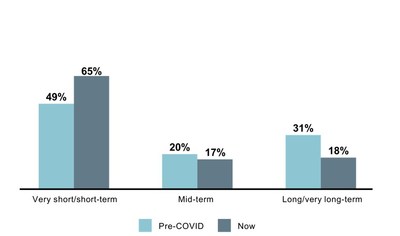New Study Shows Marketers Believe Their Companies Will Return To Normal More Quickly Than Their Lives
New research reveals that while 60% of marketers expect their companies to return to normal within a year, only 40% believe their personal lives will. Conducted by the ANA and McCann Worldgroup, the study highlights a strong belief among marketers that the pandemic will drive innovation, with 94% anticipating new ideas. However, only 18% are planning for long-term changes despite recognizing the necessity (66%). The findings emphasize the importance of aligning marketing strategies with evolving consumer needs, focusing on areas like diversity and sustainability.
- 94% of marketers believe the pandemic will inspire innovation.
- Marketers are focusing on people-driven marketing initiatives.
- 65% are now planning for the short term, indicating agility.
- Only 18% are planning for long-term consumer needs despite 66% acknowledging the change.
- A shift to short-term focus (up from 49% pre-COVID-19) could hinder future growth.
Insights
Analyzing...
NEW YORK, Aug. 18, 2020 /PRNewswire/ -- While a majority (60 percent) of marketers believe their company will be back to normal within a year, only 40 percent believe their lives will be back to normal, according to a new study.
The survey, "Marketing Through Crises: What Marketers Say," canvassed over 300 top marketers on the challenges and opportunities to their brands generated by the COVID-19 pandemic. It was conducted by the ANA and Truth Central, McCann Worldgroup's global intelligence unit.
The study revealed that marketers are much more likely to focus on the potential of the pandemic to drive innovation and creativity than the average person, likely because they expect faster change is possible in their companies than their everyday lives. For example, 94 percent of marketers believe the crisis will inspire new innovations (vs. 39 percent of global consumers) and 55 percent of marketers are inspired by the creativity they've seen (vs. 22 percent of global consumers). Those findings suggest that while marketers share the same personal health/life concerns as the average consumer, they are more optimistic about the opportunity to impact the future through the businesses they represent.
"The pandemic has had a deep and profound impact on the marketing industry, an impact that will have long lasting implications," said ANA CEO Bob Liodice. "This report demonstrates that marketers are actively addressing the transformation and addressing consumers evolving needs creatively and with increased sensitivity and passion."
The Lag in Long-Term Marketing
The study indicated that marketers are being forced to think and act for the short-term, revealing an opportunity to capitalize on long-term gains and innovation. Sixty-six percent of respondents s agreed their consumers' needs will change in the long-term, yet only 18 percent said they're planning for it.
At the same time, 65 percent of marketers said they're planning for the short term (up from 49 percent pre-COVID-19), which aligns with 82 percent of marketers who believe their customers' needs have changed in the short-term. Brands that can find the space to focus on long-term plans will have an advantage in understanding what matters most to consumers.
How far in advance was your company planning before the pandemic?
How far in advance is your company planning right now during the pandemic?
The World is Changing, But Marketing Principles Stand Firm:
Marketers predict an acceleration of existing strategies rather than an emergence of "net-new" opportunities in response to COVID-19. When asked their forecasts for the impact that COVID-19 will have on their companies, the top word in marketers' responses was "accelerate." Marketers are focused on optimizing the elements of the business they can control, such as new channels and technologies, over new markets or audiences:
How do you believe the coronavirus/COVID-19 outbreak has impacted existing marketing strategy initiatives?
Less focus/initiative on hold | More focus |
Market expansion | Channel innovation (e.g. retail innovation) |
Target audience expansion | Development/implementation of marketing technologies |
While conditions have changed, many existing industry principles are being turbo-charged because of the crisis, including:
- Do what you say
- Focus on where you can have the most impact
- Accelerated what/where you know
- Be the voice of the consumer
- Be the brand's guardian – build for the future!
"The current environment shows us that, when it comes to marketing, everything and nothing has changed," said McCann Worldgroup Global Chief Strategy Officer, Suzanne Powers. "Whether it's focusing on people or reacting in the short-term to rapidly changing market conditions while simultaneously planning for long-term objectives, these values have not arisen from the pandemic so much as they have been accelerated by them. Our past research shows that
The Power of People-Based Marketing
When asked how COVID-19 has impacted existing marketing strategies, marketers said they have maintained their commitment on people-driven initiatives, highlighting the need to continue aligning with the issues most important to consumers. To the question, "How do you believe the coronavirus/COVID-19 outbreak has impacted existing marketing strategy initiatives," marketers ranked the following at the top: Diversity and inclusion; development/implementation of data/privacy innovation; and sustainability.
For marketers to remain the voice of the consumer, they must remain constantly up to date on the values and causes about which people truly care, the study showed. To that end, 84 percent of the marketers surveyed believe they should focus their efforts on gathering consumer insights regarding changing attitudes.
To find an executive summary of "Marketing Through Crises: What Marketers Say," visit here.
About the ANA
The ANA (Association of National Advertisers)'s mission is to drive growth for marketing professionals, for brands and businesses, and for the industry. Growth is foundational for all participants in the ecosystem. The ANA seeks to align those interests by leveraging the 12-point ANA Growth Agenda, which has been endorsed and embraced by the ANA Board of Directors and the Global CMO Growth Council. The ANA's membership consists of nearly 1,600 domestic and international companies, including almost 1,000 client-side marketers and nonprofit fundraisers and 600 marketing solutions providers (data science and technology companies, ad agencies, publishers, media companies, suppliers, and vendors). Collectively, ANA member companies represent 20,000 brands, engage 50,000 industry professionals, and invest more than
About McCann Worldgroup Truth Central
McCann Truth Central is McCann Worldgroup's global intelligence unit, with representation in more than 100 countries around the world. Truth Central's mission is to create original research that unearths the macro level truths driving people's attitudes and behaviors about life, brands and marketing. For more about Truth Central or to access previous Truth Studies, visit: http://www.mccannworldgroup.com/about/truth
About McCann Worldgroup
McCann Worldgroup, part of the Interpublic Group (NYSE: IPG), is a leading global marketing solutions network with over 20,000 employees united across 100+ countries by a single vision: To help brands play a meaningful role in people's lives. McCann Worldgroup was recognized by the Cannes Lions as the 2019 Network of the Year and by the Effies as the world's most creatively-effective marketing services company both in 2018 and 2019. The network comprises McCann (advertising), MRM//McCann (science/technology/relationship marketing), Momentum Worldwide (total brand experience), McCann Health (professional/dtc communications), CRAFT (production), Weber Shandwick (public relations) and FutureBrand (consulting/design).
![]() View original content to download multimedia:http://www.prnewswire.com/news-releases/new-study-shows-marketers-believe-their-companies-will-return-to-normal-more-quickly-than-their-lives-301113790.html
View original content to download multimedia:http://www.prnewswire.com/news-releases/new-study-shows-marketers-believe-their-companies-will-return-to-normal-more-quickly-than-their-lives-301113790.html
SOURCE McCann Worldgroup








